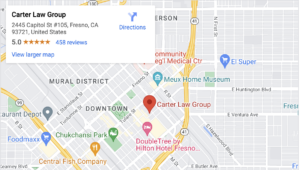Carter Law Group | July 29, 2025 | Personal Injury

A data breach can significantly affect your life and finances. Fortunately, California has strong data breach laws that cover all companies that conduct business in the state. These laws allow consumers to sue when a company handles data carelessly or fails to notify consumers of a breach.
California’s Data Breach Laws
California has two laws that apply to data breaches. The California Consumer Protection Act (CCPA) allows consumers to sue a company if a data breach results from its failure to secure their data. Specifically, a consumer must prove the business failed to implement reasonable security procedures to protect their information.
This standard is objective. In other words, the reasonableness of the business’s practices and procedures will be based on what other companies do to protect similar information. This negligence standard is similar to that used in personal injury cases.
The second law does not hold companies liable for being hacked. Instead, the statute imposes liability on businesses that fail to notify California residents of a data breach. Under this law, companies must immediately notify consumers of data security breaches and the type of information stolen.
How Do California’s Data Breach Laws Work?
These two laws work together and separately. For example, a consumer might file a claim under the CCPA if a company was careless with their information and lost their data. However, if the business sent out a timely notification, the consumer would not have a strong case under the notification law.
Similarly, a consumer may not have a CCPA case if a business suffered a data breach even though it reasonably secured their data. However, the consumer may still sue under the notification law if the company hid the breach.
Remedies for a Data Breach Notification Violation
Consumers can seek the following remedies under the CCPA and California’s data breach notification law.
Injunctive Relief
Consumers are entitled to seek an injunction when a business fails to notify or unreasonably delays a notification of a data breach. In other words, a consumer can force the business to remedy its notification procedures even if they suffered no actual losses.
Similarly, the CCPA gives consumers the right to seek an injunction against a business that is negligent in securing data. Again, the consumer can ask for this whether they have any actual losses or not.
Statutory Damages
The CCPA authorizes statutory damages. The amount may range from $100 to $750 per incident, to be determined by a judge.
The law allows the judge to consider the following factors in setting the amount:
- Nature and severity of the business’s carelessness
- Number of records lost
- Persistence of the carelessness
- Length of time the carelessness lasted
- Willfulness of the misconduct that led to the breach
- Financial state of the business
For example, a company that mishandled data despite being warned to change its practices might face higher statutory damages than one that fixed its problems.
Compensation for Actual Losses
The CCPA allows consumers to seek compensation for actual economic losses or statutory damages, whichever is higher. The data breach notification law allows compensation only for actual losses.
Actual losses include any costs or liabilities incurred due to the company’s legal violation, such as:
- Money or property lost in the breach
- Costs associated with canceling cards or replacing IDs
- Fees for credit repair services
The CCPA does not address non-economic losses like emotional distress. It refers to “actual pecuniary damages,” which suggests that non-economic losses are not recoverable in a CCPA claim.
Contact Our Fresno Personal Injury Lawyers at Carter Law Group for Help After a Data Breach
California’s data breach laws are designed to push companies into using standard security practices for their industries and promptly notifying consumers of breaches.
When a business fails to take either of these measures, California gives affected consumers the right to pursue civil claims against the business. The CCPA allows you to seek an injunction and statutory damages or compensation for actual losses, whichever is greater. The breach notification law allows for injunctions and compensation for actual losses.
If you need legal help after a data breach, call our Fresno personal injury lawyers at Carter Law Group for a free consultation.
Visit Our Personal Injury Law Firm in Fresno, CA
Carter Law Group
2445 Capitol St #105, Fresno, CA 93721, United States
(559) 485-1212

